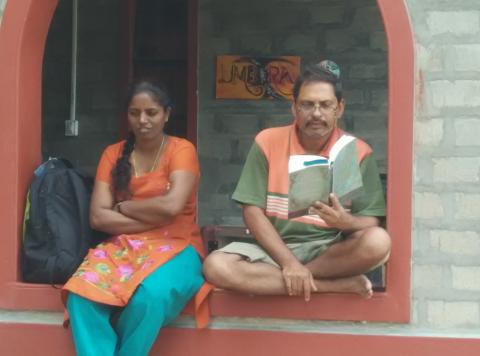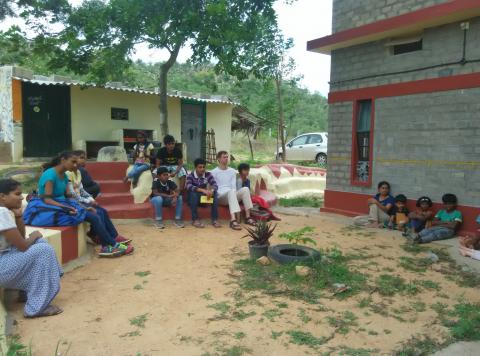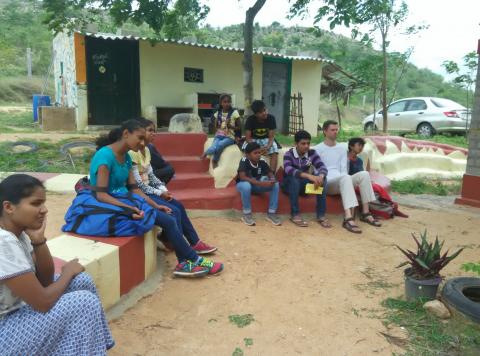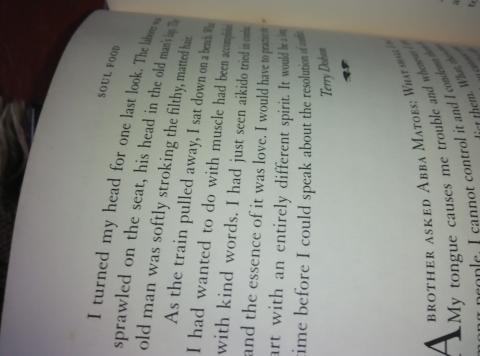



When two people fight… it leads to more fight or judging right and wrong….. Here is a story to read. We read this story on the theme of compassion in Aarohi thought club .. how words can create love and compassion and change lives.
By TERRY DOBSON
A turning point came in my life one day on a train in the suburbs of Tokyo, in the middle of a drowsy spring afternoon. The old car clanked and rattled over the rails. It was comparatively empty—a few housewives with their kids in tow, some old folks out shopping, a couple of off-duty bartenders studying the racing form. I gazed absently at the drab houses and dusty hedgerows.
At one station the doors opened, and suddenly the quiet afternoon was shattered by a man bellowing at the top of his lungs, yelling violent, obscene, incomprehensible curses. Just as the doors closed, the man still yelling, staggered into our car. He was big, drunk and dirty. He wore laborer’s clothing. His front was stiff with dried vomit. His eyes bugged out, a demonic, neon red. His hair was crusted with filth. Screaming, he swung at the first person he saw, a woman holding a baby. The blow glanced off her shoulder, sending her spinning into the laps of an elderly couple. It was a miracle that the baby was unharmed.
The couple jumped up and scrambled toward the other end of the car. They were terrified. The laborer aimed a kick at the retreating back of the old lady. “YOU OLD WHORE !” he bellowed, ‘I’LL KICK YOUR ASS!” He missed, the old woman scuttled to safety. This so enraged the drunk that he grabbed the metal pole in the center of the car, and tried to wrench it out of its stanchion. I could see that one of his hands was cut and bleeding. The train lurched ahead, the passengers frozen with fear. I stood up.
I was young and in pretty good shape. I stood six feet, and weighed 225. I’d been putting in a solid eight hours of Aikido training every day for the past three years. I liked to throw and grapple. I thought I was tough. Trouble was my martial skill was untested in actual combat. As students of Aikido, we were not allowed to fight.
My teacher, the founder of Aikido, taught us each morning that the art was devoted to peace. “Aikido,” he said again and again, “is the art of reconciliation. Whoever has the mind to fight has broken his connection with the universe. If you try to dominate other people, you are already defeated. We study how to resolve conflict, not how to start it.”
I listened to his words. I tried hard. I wanted to quit fighting. I even went so far as to cross the street a few times to avoid the chimpira, the pinball punks who lounged around the train stations. They’d have been happy to test my martial ability. My forbearance exalted me. I felt both tough and holy. In my heart of hearts, however, I was dying to be a hero. I wanted a chance, an absolutely legitimate opportunity whereby I might save the innocent by destroying the guilty.
“This is it!” I said to myself as I got to my feet. : This slob, this animal, is drunk and mean and violent. People are in danger. If I don’t do something fast, somebody will probably get hurt. I’m gonna take his ass to the cleaners.”
Seeing me stand up, the drunk saw a chance to focus his rage. “AHA!” he roared, “A FOREIGNER! YOU NEED A LESSON IN JAPANESE MANNERS!” He punched the metal pole once to give weight to his words.
I held on lightly to the commuter-strap overhead. I gave him a slow look of disgust and dismissal. I gave him every bit of piss-ant nastiness I could summon up. I planned to take this turkey apart, but he had to be the one to move first. And I wanted him mad, because the madder he got the more certain my victory. I pursed my lips and blew him a sneering, insolent kiss. It hit him like a slap in the face. “ALL RIGHT! he hollered, “YOUR GONNA GET A LESSON.” He gathered himself for a rush at me. He’d never know what hit him.
A split-second before he moved, someone shouted “HEY!” It was ear splitting. I remember being hit by the strangely joyous, lilting quality of it— as though you and a friend had been searching diligently for something, and he had suddenly stumbled upon it. “HEY!”
I wheeled to my left, the drunk spun to his right. We both stared down at a little old Japanese. He must have been well into his seventies, this tiny gentleman, sitting there immaculate in his kimono and hakama. He took no notice of me, but beamed delightedly at the laborer, as though he had a most important, most welcome secret to share. “C’mere,” the old man said in an easy vernacular, beckoning to the drunk, “C’mere and talk with me.” He waved his hand lightly. The big man followed, as if on a string. He planted his feet belligerently in front of the old gentleman, and towered threateningly over him. “TALK TO YOU,” he roared above the clacking wheels, “WHY THE HELL SHOULD I TALK TO YOU ?” The drunk now had his back to me. If his elbows moved so much as a millimeter, I’d drop him in his socks.
The old man continued to beam at the laborer. There was not a trace of fear or resentment about him. “What’cha been drinking?” he asked lightly, his eyes sparkling with interest. “I BEEN DRINKING SAKE,” the laborer bellowed back, “AND IT’S NONE OF YOUR GODDAM BUSINESS!” Flecks of spittle spattered the old man.
“Oh, that’s wonderful,” the old man said with delight, “absolutely wonderful! You see, I love sake too. Every night, me and my wife (she’s 76, you know), we warm up a little bottle of sake and take it out into the garden, and we sit on the old wooden bench that my grandfather’s first student made for him. We watch the sun go down, and we look to see how our persimmon tree is doing. My grandfather planted that tree, you know, and we worry about whether it will recover from those ice-storms we had last winter. Persimmons do not do well after ice-storms, although I must say that ours has done rather better than I expected, especially when you consider the poor quality of the soil. Still, it most gratifying to watch when we take our sake and go out to enjoy the evening—even when it rains!” He looked up at the laborer, eyes twinkling, happy to share his delightful information.
As he struggled to follow the intricacies of the old man’s conversation, the drunk’s face began to soften. His fists slowly unclenched. “Yeah,” he said slowly, “I love persimmons, too… His voice trailed off. “Yes”, said the old man, smiling, “and I’m sure you have a wonderful wife.”
“No,” replied the laborer, “My wife died.” He hung his head. Very gently, swaying with the motion of the train, the big man began to sob. “I don’t got no wife, I don’t got no home, I don’t got no job, I don’t got no money, I don’t got nowhere to go. I’m so ashamed of myself.” Tears rolled down his cheeks, a spasm of pure despair rippled through his body. Above the baggage rack a four-color ad trumpeted the virtues of suburban luxury living.
Now it was my turn. Standing there in my well-scrubbed youthful innocence, my make- this- world-safe-for- democracy righteousness, I suddenly felt dirtier than he was.
Just then, the train arrived at my stop. The platform was packed, and the crowd surged into the car as soon the doors opened. Maneuvering my way out, I heard the old man cluck sympathetically. “My, My,” he said with undiminished delight, “that is a very difficult predicament, indeed. Sit down here and tell me about it.”
I turned my head for one last look. The laborer was sprawled like a sack on the seat, his head in the old man’s lap. The old man looked down at him with compassion and delight, one hand stroking the filthy, matted head.
As the train pulled away, I sat down on a bench. What I had wanted to do with muscle and meanness had been accomplished with a few kind words. I had seen Aikido tried in combat, and the essence of it was love, as the founder had said. I would have to practice the art with an entirely different spirit. It would be a long time before I could speak about the resolution of conflict.